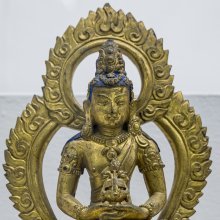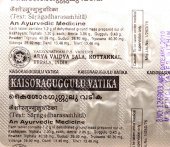Amrita, Amṛtā, Amṛta: 51 definitions
Introduction:
Amrita means something in Buddhism, Pali, Hinduism, Sanskrit, Jainism, Prakrit, Marathi, Hindi, biology. If you want to know the exact meaning, history, etymology or English translation of this term then check out the descriptions on this page. Add your comment or reference to a book if you want to contribute to this summary article.
Amrita has 50 English definitions available.
The Sanskrit terms Amṛtā and Amṛta can be transliterated into English as Amrta or Amrita, using the IAST transliteration scheme (?).
Alternative spellings of this word include Amrat.
Images (photo gallery)
Languages of India and abroad
Sanskrit dictionary
[Deutsch Wörterbuch]
Source: Cologne Digital Sanskrit Dictionaries: Böhtlingk and Roth Grosses Petersburger WörterbuchAmṛta (अमृत):—
--- OR ---
Āmṛta (आमृत):—(von mar, mriyate mit ā) adj. sterblich, s. anāmṛta .
--- OR ---
Amṛta (अमृत):—
1) a) hatvā cainaṃ nāmṛtaḥ syādayaṃ me [Mahābhārata 13, 23.] — b) [Z. 3 lies 8, 48, 3 Stenzler 8, 48, 1.] subst. ein unsterbliches Wesen, ein Gott [Spr. 4302.] —
3) b) λ) sarvauṣadhīnāmamṛtā (= dūrvā Schol.) pradhānā [Spr. 5208.] — d) Beiname der Dākṣāyaṇī [Oxforder Handschriften 39,b,19. 31.] — e) N. der ersten Kalā des Mondes [Oxforder Handschriften 18,b,24.] —
4) b) [Spr. 3561. 4302. 4331.] — e) ein best. Heilmittel [Śiśupālavadha 9, 36.] Arzenei überh. [WASSILJEW 199.] — p) yathāmṛtaghaṭaṃ daṃśāḥ (viśanti) [Rāmāyaṇa 7, 7, 3.] amṛta = kṣaudra Schol. — u) saurībhiriva nāḍībhiramṛtākhyābhiḥ [Raghuvaṃśa 10, 59.] — v) [Oxforder Handschriften 258,b,10.] — w) ein Metrum von 4 x 54 Silben [Prātiśākhya zum Ṛgveda 17, 4.] [Weber’s Indische Studien 8, 107. 111.]
--- OR ---
Amṛta (अमृत):—
4) m) [Spr. (II) 2986.]
Source: Cologne Digital Sanskrit Dictionaries: Sanskrit-Wörterbuch in kürzerer FassungAmṛta (अमृत):——
1) Adj. (f. ā) — a) nicht gestorben [Mahābhārata 1,159,17.13,1,23.] — b) unsterblich. — c) unvergänglich. — d) *schön , lieblich. —
2) m. — a) ein Gott. — b) Beiname — α) Śiva's. — β) *Dhanvantari's. — c) *Plaseolus trilobus Ait. — d) *Yamswurzel. —
3) f. ā — a) eine Göttin. — b) Cocculus_cordifolius Dc. , Panicum Dactylon [Indische sprüche 6959.] *Emblica_officinalis Gaertn. , *Terminalia_citrina Roxb. , *Piper_longum L. , *Ocimum sanetum , *Koloquinthengurke , *Halicacabum cardiospermum u.s.w. — c) *ein berauschendes Getränk. — d) die erste Kalā des Mondes. — e) Beiname der Dākṣāyaṇī. — f) Nomen proprium — α) der Mutter des Parīkṣit. — β) einer Schwester Amṛtodana's. —
4) n. — a) Gesammtheit der Unsterblichen. — b) Welt der Unsterblichkeit , das ewige Reich. — c) das Nichtwegsterben [Ṛgveda (roth). 1,159,2.7,57,6.] — d) Unsterblichkeit. — e) die letzte Befreiung. — f) Unsterblichkeitstrank , ἀμβροσία , nektar. Häufig so v.a. der Gipfel aller Genüsse. — g) Süssigkeit [Rāmāyaṇa 7,7,3.] — h) ein best. Heilmittel ; Arzenei überh. — i) Ueberbleibsel eines Opfers ; vgl. [Bhagavadgitā 4,31.] — k) unerbetteltes Almosen. — l) Wasser [Indische sprüche 7806.] (zugleich Nektar ). — m) Milch [Indische sprüche 2986.] *warme Milch. — n) *geklärte Butter. — o) *gekochter Reis. — p) *Speise. — q) *Birne [Madanapāla’s Madanavinoda 68,57.] — r) Gold. — s) *Quecksilber. — t) *Gift überh. und *ein best. Gift. — u) Strahl. — v) *Eigenthum. — w) ein best. Metrum. — x) Nomen proprium eines Sitzes der Götter im Norden.
Sanskrit, also spelled संस्कृतम् (saṃskṛtam), is an ancient language of India commonly seen as the grandmother of the Indo-European language family (even English!). Closely allied with Prakrit and Pali, Sanskrit is more exhaustive in both grammar and terms and has the most extensive collection of literature in the world, greatly surpassing its sister-languages Greek and Latin.
See also (Relevant definitions)
Starts with (+271): Amrita balli, Amrita pandita, Amrita shanti, Amrita-gana, Amrita-muhurta, Amrita-padi, Amritaballi, Amritabana, Amritabandhu, Amritabdhi, Amritabhakshya, Amritabhallataki, Amritabhanu, Amritabharati, Amritabhashana, Amritabhava, Amritabhavana, Amritabhisheka, Amritabhishikta, Amritabhojana.
Ends with (+169): Abhinavamrita, Aciramrita, Adharamrita, Advaitakalamrita, Advaitamrita, Aitareyajnanamrita, Anamrita, Ananamrita, Anandamrita, Bhagavatamrita, Bhajanamrita, Bhaktamrita, Bhaktirasamrita, Bharatamrita, Bhavanamrita, Bhojaniyamrita, Brahmamrita, Brihadbhagavatamrita, Caitanyacandramrita, Caitanyacaranamrita.
Full-text (+582): Amritaharana, Amritavalli, Amritarasa, Amriteshaya, Amritasodara, Anamrita, Amritakunda, Amritamanthana, Amritadhara, Amritayoga, Amritandhas, Amritashana, Amritadidhiti, Amritatarangini, Amritaphala, Amritaja, Amritalata, Amritamshu, Tridashahara, Amritadrava.
Relevant text
Search found 149 books and stories containing Amrita, Amṛtā, Amṛta, Amrta, A-mrita, A-mṛta, A-mrta, A-mṛtā, Āmṛta, Ā-mṛta; (plurals include: Amritas, Amṛtās, Amṛtas, Amrtas, mritas, mṛtas, mrtas, mṛtās, Āmṛtas). You can also click to the full overview containing English textual excerpts. Below are direct links for the most relevant articles:
Rig Veda (translation and commentary) (by H. H. Wilson)
Garga Samhita (English) (by Danavir Goswami)
Verse 1.11.9 < [Chapter 11 - Description of Śrī Kṛṣṇacandra’s Birth]
Verse 5.5.34 < [Chapter 5 - Śrī Kṛṣṇa’s Entrance Into Mathurā]
Verse 8.13.68 < [Chapter 13 - A Thousand Names of Lord Balarāma]
Shrimad Bhagavad-gita (by Narayana Gosvami)
Verses 9.16-19 < [Chapter 9 - Rāja-guhya-yoga (Yoga through the most Confidential Knowledge)]
Verse 18.38 < [Chapter 18 - Mokṣa-yoga (the Yoga of Liberation)]
Verse 10.18 < [Chapter 10 - Vibhūti-yoga (appreciating the opulences of the Supreme Lord)]
Amarakoshodghatana of Kshirasvamin (study) (by A. Yamuna Devi)
Vedic Sacrifices < [Chapter 4 - Cultural Aspects]
The Concept of Heaven < [Chapter 4 - Cultural Aspects]
Brihad Bhagavatamrita (commentary) (by Śrī Śrīmad Bhaktivedānta Nārāyana Gosvāmī Mahārāja)
Verse 1.1.66-69 < [Chapter 1 - Bhauma (the earthly plane)]
Verse 1.1.9 < [Chapter 1 - Bhauma (the earthly plane)]
Verse 2.3.162 < [Chapter 3 - Bhajana (loving service)]
The Great Chariot (by Longchenpa)
Part 5 - How these are classified as the external secret mantra < [A. Resolving the view]
Part 3a.3 - The conduct accompanying that < [B. The explanation of meditation practice, together with its action of ripening and freeing]
Part 3a.2 - The divisions of root and branch samayas < [B. The explanation of meditation practice, together with its action of ripening and freeing]
Related products
(+36 more products available)







